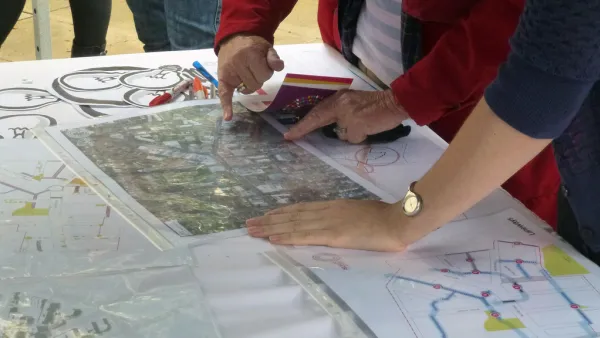A bit of a redefining moment is happening among European planners as they look for ways to address the growing complexity of their communities and the world.
"Call it post-planning, planning 2.0, or maybe un-planning. And the crazy thing is, this revolt against traditional approaches to planning is being conducted by planners themselves," writes Anthony Flint to introduce a recent article about the "identity crisis" in contemporary planning.
Flint's discussion of the evolution of planning follows his attendance of the annual Association of European Schools of Planning conference, where "there was no little soul-searching about the practice of the craft." Rather, Flint writes, planners there were wondering whether, "despite the grand efforts, planning wasn’t really paying off."
As for why: "Global urbanization carries multiple complexities, with loads of unintended consequences and unanticipated outcomes, whether in Cleveland or London or Bogota. If the future is not linear, planning in a linear fashion is the equivalent of banging one’s head against the drafting table."
The article focuses on the exchange of ideas between European planning and American planning, which, already complicated by American political concerns about socialism and Agenda 21 fear mongering, could now be further complicated by European rejection of Smart Growth and other ideas exported by continental planers. According to Flint, "smart growth, whether urban growth boundaries or compact transit-oriented development, is essentially European. And now the Europeans are saying the command-and-control approach doesn’t work so well. European nations are actually adopting more of an American stance—a decentralized agenda, pushing down remaining responsibilities to local jurisdictions, and counting on local planners to engage the citizenry much more."
The article goes on to describe a future for planning, advocated by attendees at the event, that will allow for complexity and evolution in a more complex and connected world.
FULL STORY: Is Urban Planning Having an Identity Crisis?

Analysis: Cybertruck Fatality Rate Far Exceeds That of Ford Pinto
The Tesla Cybertruck was recalled seven times last year.

National Parks Layoffs Will Cause Communities to Lose Billions
Thousands of essential park workers were laid off this week, just before the busy spring break season.

Retro-silient?: America’s First “Eco-burb,” The Woodlands Turns 50
A master-planned community north of Houston offers lessons on green infrastructure and resilient design, but falls short of its founder’s lofty affordability and walkability goals.

Test News Post 1
This is a summary

Analysis: Cybertruck Fatality Rate Far Exceeds That of Ford Pinto
The Tesla Cybertruck was recalled seven times last year.

Test News Headline 46
Test for the image on the front page.
Urban Design for Planners 1: Software Tools
This six-course series explores essential urban design concepts using open source software and equips planners with the tools they need to participate fully in the urban design process.
Planning for Universal Design
Learn the tools for implementing Universal Design in planning regulations.
EMC Planning Group, Inc.
Planetizen
Planetizen
Mpact (formerly Rail~Volution)
Great Falls Development Authority, Inc.
HUDs Office of Policy Development and Research
NYU Wagner Graduate School of Public Service




























